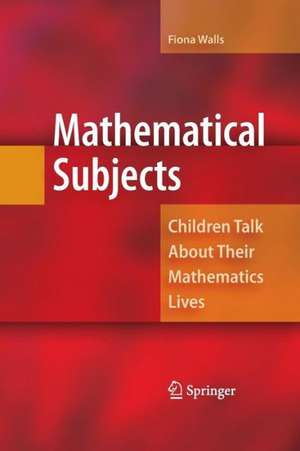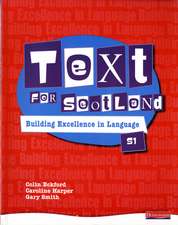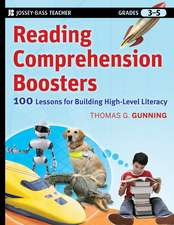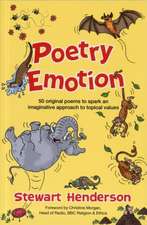Mathematical Subjects: Children Talk About Their Mathematics Lives
Autor Fiona Wallsen Limba Engleză Paperback – 26 noi 2014
| Toate formatele și edițiile | Preț | Express |
|---|---|---|
| Paperback (1) | 640.71 lei 6-8 săpt. | |
| Springer Us – 26 noi 2014 | 640.71 lei 6-8 săpt. | |
| Hardback (1) | 647.08 lei 6-8 săpt. | |
| Springer Us – 21 aug 2009 | 647.08 lei 6-8 săpt. |
Preț: 640.71 lei
Preț vechi: 753.77 lei
-15% Nou
Puncte Express: 961
Preț estimativ în valută:
122.62€ • 126.67$ • 102.05£
122.62€ • 126.67$ • 102.05£
Carte tipărită la comandă
Livrare economică 26 martie-09 aprilie
Preluare comenzi: 021 569.72.76
Specificații
ISBN-13: 9781489983732
ISBN-10: 1489983732
Pagini: 304
Ilustrații: XVI, 286 p.
Dimensiuni: 155 x 235 x 16 mm
Greutate: 0.43 kg
Ediția:2009
Editura: Springer Us
Colecția Springer
Locul publicării:New York, NY, United States
ISBN-10: 1489983732
Pagini: 304
Ilustrații: XVI, 286 p.
Dimensiuni: 155 x 235 x 16 mm
Greutate: 0.43 kg
Ediția:2009
Editura: Springer Us
Colecția Springer
Locul publicării:New York, NY, United States
Public țintă
ResearchCuprins
Understanding Children as Mathematical Subjects: Theories and Methods.- Of Subjects, Subjectivity, and Subjectification: Subjects Made Visible.- Of Archaeology, and Genealogy: Choosing Sites and Tools.- The Art of Being Mathematical: The Primary Years.- Children at Work.- Tests and Contests.- Error and Correction.- The Emergence of Ability.- Subjects of Choice: The Secondary Years.- Form and Formula.- Measures of Success.- Keeping Up.- The Shape of Life.- Mathematical Futures: Life After School.- Girl Time and Boys’ Clubs: Mathematical Genderfication.- Background or Foreground? Home, Social Class and Ethnicity.- Contemplating a Child-Friendly Mathematical Education.
Textul de pe ultima copertă
We know the process by which children become social, moral, and creative beings, but when—and how—do they become mathematical beings? This thought-provoking volume follows ten children (ages seven through eighteen) in schools in New Zealand, England, Australia, Sweden, and an international school in Switzerland as they come to recognize the mathematical as part of their lives, their academic identities, and their identities as human beings. Through these students’ experiences important themes emerge, including mathematics as work, a domain of learning, and an avenue for competition; mathematical ability as a key to how they are perceived by others; and the relationships between mathematics achievement and the larger social and academic picture. This comparative study of educational systems and academic development will inform readers in these and other salient areas:
- Theoretical bases for understanding children as mathematical subjects.
- Help in creating the mathematical self: tutoring and related programs.
- The roles of compulsory study and standardized assessment.
- Class and ethnic content in children’s math narratives.
- The gendering of mathematical ability and activity.
- What children’s math experience can teach us about teaching the subject.
Caracteristici
Encourages dialogue on gender divide in mathematics Enables children to exercise their right to speak on their own behalf Based in research and written in an engaging and compelling style Includes supplementary material: sn.pub/extras









